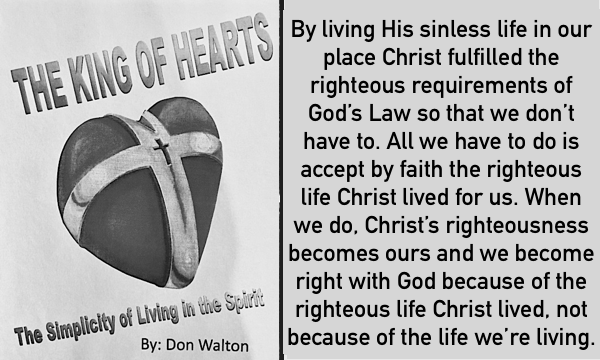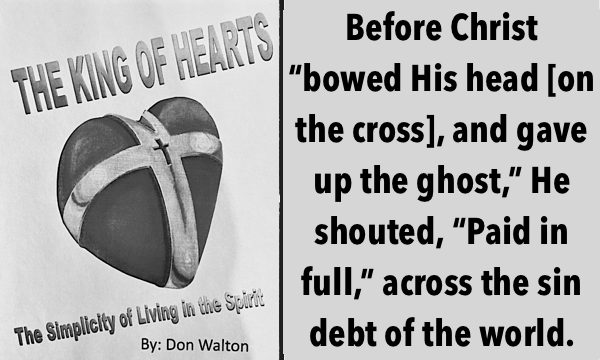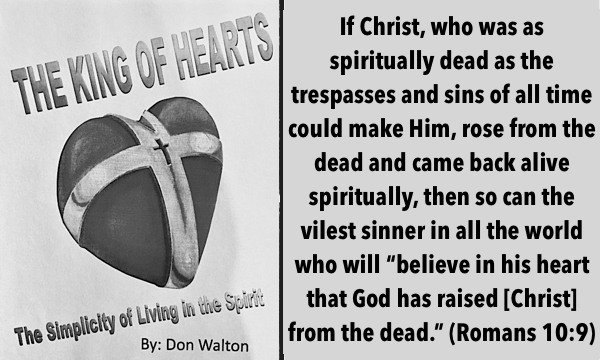The only way for man to be saved from his sin and reconciled to God is through faith in the Lord Jesus Christ. There is absolutely nothing we can do to save ourselves from spiritual death and to restore our communion with God. It is because of our hopeless and helpless lost condition that Christ came into our world to do for us what we could never do for ourselves. Through His life, death and resurrection Christ has done everything necessary for our salvation. All that remains for us to do is accept by faith all that Christ has done for us.
In order for you and I to make ourselves righteous before God we must meet the righteous requirements of God’s Law. What God’s Law requires is sinless perfection. According to the Apostle Paul, God’s Law requires perfect obedience on all points and at all times (Galatians 3:10). James adds that the least little infraction of any part leaves one as guilty before God as if he had violated the whole Law (James 2:10). This high standard of sinless perfection is far too lofty for fallen sinners to live up to. Therefore, as the Apostle Paul teaches in Romans 3:20 and Galatians 2:16, none of us have any hope of ever being right with God by living up to the Law.
 Since you and I cannot possibly live a sinless life in order to become righteous before God and right with Him, Christ came and lived a sinless life for us (2 Corinthians 5:21; 1 Peter 2:22, Hebrews 4:15). By living His sinless life in our place Christ fulfilled the righteous requirements of God’s Law so that we don’t have to (Matthew 3:15, 5:17). All we have to do is accept by faith the righteous life that Christ lived for us. When we do, Christ’s righteousness becomes ours and we become right with God because of the life Christ lived, not because of the life we’re living. This is why the Apostle Paul calls Christ “our righteousness” (1 Corinthians 1:30). It is also why Paul wrote that he wanted to “be found in [Christ], not having [his] own righteousness, which is of the law, but the righteousness which is through the faith of Christ, the righteousness which is of God by faith” (Philippians 3:9).
Since you and I cannot possibly live a sinless life in order to become righteous before God and right with Him, Christ came and lived a sinless life for us (2 Corinthians 5:21; 1 Peter 2:22, Hebrews 4:15). By living His sinless life in our place Christ fulfilled the righteous requirements of God’s Law so that we don’t have to (Matthew 3:15, 5:17). All we have to do is accept by faith the righteous life that Christ lived for us. When we do, Christ’s righteousness becomes ours and we become right with God because of the life Christ lived, not because of the life we’re living. This is why the Apostle Paul calls Christ “our righteousness” (1 Corinthians 1:30). It is also why Paul wrote that he wanted to “be found in [Christ], not having [his] own righteousness, which is of the law, but the righteousness which is through the faith of Christ, the righteousness which is of God by faith” (Philippians 3:9).
In order to save us from our sins and reconcile us to God, Christ had to do more than just live in our place. He also had to die in our place. Not only did He have to live a righteous life so that we could be righteous, but He also had to die for our sins so that we could be forgiven.
Before our sins against God can be forgiven our sin debt must be paid. God, being just, can never wink at our sins or just simply overlook them. He must demand payment in full, lest He cease to be just. His justice demands that our sin debt be paid off before any pardon can be offered.
What is the debt of sin? According to the Bible, “The wages of sin is death” (Romans 6:23). Wages are something you earn. Every sinner in the world is sentenced to death, because we’ve earned it. It is not just physical death that is our just deserts; it is spiritual death as well. Our rebellion against God has not only earned us an end to our earthly life, but also the forfeiture of eternal life. Our sins against God have earned us an eternal separation from Him.
For every sin that has ever been committed someone must surely die. Not one sin can go unpunished; all must be paid for. This is why Hebrews 9:22 says, “And almost all things are by the law purged with blood; and without the shedding of blood is no remission.” Since “life is in the blood” (see Leviticus 17:11), blood must be shed and life poured out before any sin can be forgiven. In other words, the only hope we have of being forgiven of our sins and escaping death is if someone should shed their blood in place of ours and dare to die in our place.
 Since you and I cannot pay the sin debt we owe God, Christ came into the world to pay it for us on the cross. By shedding His blood in place of ours and dying in our place Christ has made it possible for you and I to be forgiven of our sins and reconciled to God. That Christ paid our sin debt, as well as that of the whole world (1 John 2:2), is proven by His triumphant shout from the cross, “It is finished!” (John 19:30). This Greek word, “telelestai,” literally means “paid in full.” Papyri receipts from the time of Christ have been recovered with the word “telelestai” written across them. Before Christ “bowed His head [on the cross], and gave up the ghost,” He shouted, “Paid in full!” across the sin debt of the world.
Since you and I cannot pay the sin debt we owe God, Christ came into the world to pay it for us on the cross. By shedding His blood in place of ours and dying in our place Christ has made it possible for you and I to be forgiven of our sins and reconciled to God. That Christ paid our sin debt, as well as that of the whole world (1 John 2:2), is proven by His triumphant shout from the cross, “It is finished!” (John 19:30). This Greek word, “telelestai,” literally means “paid in full.” Papyri receipts from the time of Christ have been recovered with the word “telelestai” written across them. Before Christ “bowed His head [on the cross], and gave up the ghost,” He shouted, “Paid in full!” across the sin debt of the world.
Since “Jesus paid it all,” as the title of a beloved old hymn attests, all we need to do to be forgiven of our sins and reconciled to God is accept by faith Christ’s substitutionary death upon the cross. When we do, our sin is forever pardoned and our sin debt paid in full. It is as though Christ gives us from His own nail-scarred hand a receipt for our sin debt signed in His own blood “Paid in full!”
Even more important to our salvation than the substitutionary death He died or the righteous life He lived is Christ’s resurrection from the dead. Though Christ’s righteous life and substitutionary death make it possible for us to be right with God and forgiven by Him, there is still the weightier matter of us being spiritually dead to God. How can we who are spiritually dead in our trespasses and sin ever become spiritually alive to God? The answer to this seemingly unanswerable question is found in the resurrection of Jesus Christ.
According to the Apostle Paul, the whole of our Christian faith hinges on the resurrection of Jesus Christ. “If Christ be not risen,” Paul writes, “then is our preaching vain, and our faith is also vain. Yea, and we are found to be false witnesses of God; because we have testified of God that he raised up Christ: whom he raised not up” (1 Corinthians 15:14-15). Paul goes on to add that without Christ’s resurrection we are still “in our sins,” our loved ones who have “fallen asleep in Christ are perished” and “we are of all men most miserable” (1 Corinthians 15:17-19).
When Christ died on the cross He did more than just die for our sins; according to the Scripture, He actually became our sin (2 Corinthians 5:21). When Christ became our sin on the cross of Calvary God the Father poured out the full fury of His wrath on Christ for every sin that has been or ever will be committed. On the cross, Christ suffered the full punishment for all the sins of all time. This explains why Christ, already kneeling under the shadow of the cross, suffered such agony in the Garden of Gethsemane (Matthew 26:36-45, Luke 22:39-46). It was not, as is commonly believed, the physical pain and suffering of the cross that caused Christ to shrink back and His sweat to become like “great drops of blood” in the garden. Instead, it was the fact that Christ was about to become the sin of the world and suffer the full brunt of His Father’s wrath. Although the physical death Christ died on the cross would be more than enough to cause most men to sweat blood, it was the spiritual death that He was facing that caused Christ’s anguish in Gethsemane.
The fact that Christ experienced spiritual death—separation from God the Father—is made abundantly clear by Christ’s bloodcurdling cry from the cross, “My God, my God, why hast thou forsaken me” (Matthew 27:46). When Christ died on the cross, becoming the sin of the world, God the Father turned His back on His Son. Since God cannot look upon sin (Habakkuk 1:13), He turned away from His Son as soon as His Son took upon Himself the sin of the world.
With “the Father of lights” (James 1:17) turning away and “the light of the world” (John 8:12; 9:5) doused out by the sin of the world, is there any wonder that the Scripture says the earth was suddenly shrouded in an inexplicable darkness (Matthew 27:45)? Suspended between heaven and earth and forsaken by both, Christ hung that dark day on the cruel cross of Calvary. Alone and abandoned Christ died for you and me.
Following His death, Christ’s body was taken down from the cross and buried in a borrowed tomb. From the time of Christ’s interment until He arose on that first Easter Sunday morning the drama of all the ages was played out. Could Christ, ensepulchered in the stead of all the sinners of the world, ever come alive to God again? This question for the ages, posed by Christ’s occupied tomb, was resoundingly answered in the affirmative by His empty one!
 In spite of being as spiritually dead to God the Father as all the sins of all time could make Him, Christ came back alive to the Father when He arose from the dead on that first Easter Sunday morning. This is why the Bible teaches that Christ was spiritually justified and made alive in the spirit when He arose from the dead (1 Timothy 3:16; 1 Peter 3:18). If Christ, who was as spiritually dead as the trespasses and sins of all time could make Him, rose from the dead and came back alive spiritually, then so can the vilest sinner in all of the world who will “believe in his heart that God has raised [Christ] from the dead" (Romans 10:9). No matter how spiritually dead you are in your trespasses and sins, you too can rise from the dead and come alive to God through faith in the resurrected Christ. This hope of spiritual life is at the very heart of the gospel and the reason it all hinges upon Christ’s resurrection.
In spite of being as spiritually dead to God the Father as all the sins of all time could make Him, Christ came back alive to the Father when He arose from the dead on that first Easter Sunday morning. This is why the Bible teaches that Christ was spiritually justified and made alive in the spirit when He arose from the dead (1 Timothy 3:16; 1 Peter 3:18). If Christ, who was as spiritually dead as the trespasses and sins of all time could make Him, rose from the dead and came back alive spiritually, then so can the vilest sinner in all of the world who will “believe in his heart that God has raised [Christ] from the dead" (Romans 10:9). No matter how spiritually dead you are in your trespasses and sins, you too can rise from the dead and come alive to God through faith in the resurrected Christ. This hope of spiritual life is at the very heart of the gospel and the reason it all hinges upon Christ’s resurrection.
In Psalm 2:7, God the Father says to Christ, “Thou art my Son; this day have I begotten thee.” Being eternal and without beginning or end, when was Christ ever begotten by the Father? According to the Apostle Paul, Christ was begotten by the Father when He was raised from the dead. In Acts 13:33, Paul says, “God hath fulfilled the same unto us their children, in that he hath raised up Jesus again; as it is also written in the second psalm, Thou art my Son, this day have I begotten thee.”
Did you know that Jesus Christ was the first person to ever be born again? He was the first person to come back alive to God after being spiritually dead in trespasses and sin. However, Christ’s spiritual death was not the result of His sin, but of Him becoming ours. When Christ arose, coming back alive to God the Father, the Father said to Him, “Thou art my Son, this day have I begotten thee.”
As “the first born from the dead”; that is, as the first person to ever come back alive to God after being spiritually dead to Him, Christ has become “the head of the body, the church” (Colossians 1:18). What is the church? It is simply all of those, like Christ, who have been born again. The church is made up of those who were once dead to God in their trespasses and sins, but now have come alive to God through faith in the resurrected Christ.
According to the Apostle Paul, everyone in the church has been foreknown and predestined by God “to be conformed to the image of his Son, that he might be the firstborn among many brethren” (Romans 8:29). God wants many more children like His firstborn Son, Jesus Christ. Born again children to whom God can say, on the day they place their faith in His firstborn Son, “Thou art my [child], this day have I begotten thee.” All of those begotten by the Father through faith in His risen Son become Christ’s “brethren” and members of Christ’s body, “the church of the firstborn” (Hebrews 12:23).